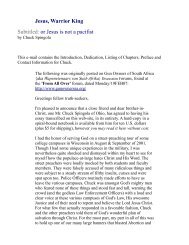THE PINK SWASTIKA - Shattering Denial
THE PINK SWASTIKA - Shattering Denial
THE PINK SWASTIKA - Shattering Denial
Create successful ePaper yourself
Turn your PDF publications into a flip-book with our unique Google optimized e-Paper software.
HOMO-OCCULTISM<br />
Chapter Two<br />
The story of the occult in world history is also a story of homosexuality. By occult, we mean the<br />
formalized religious expression of pagan culture as opposed, for example, to the philosophical ideas of<br />
Hellenic paganism discussed in the previous chapter. In The Occult Roots of Nazism, historian<br />
Nicholas Goodrick-Clarke identifies the roots of occultism in western history:<br />
Occultism has its basis in a religious way of thinking, the roots of which stretch back into antiquity....Its<br />
principal ingredients have been identified as Gnosticism, the Hermetic treatises on alchemy and magic<br />
[rooted in Gnosticism], Neo-Platonism, and the Cabbala....Gnosticism properly refers to the beliefs of<br />
certain heretical sects among the early Christians that claimed to possess gnosis, or special esoteric<br />
knowledge of spiritual matters....The Gnostic sects disappeared in the fourth century, but their ideas<br />
inspired the dualistic Manichaean religion of the second century (Goodrick-Clarke:17)<br />
Since occultism is associated primarily with Gnosticism, the association of the Gnostics with<br />
homosexuality is of primary relevance to this study. Thus we found an obscure reference to Hitler as a<br />
Manichaean in Steven Katz’s The Holocaust in Historical Context, Volume 1, of interest. Arthur<br />
Evans’ Witchcraft and the Gay Counterculture provides some illumination here. Mani, for whom<br />
Manichaeism is named, was a third century Prince of Babylon who devised his own form of<br />
Gnosticism. Gnostics blended pagan sex rituals and Mother Goddess worship with elements of New<br />
Testament Christianity and “rejected Jehovah God as an evil demon.” Manichaeism imposed on<br />
Gnosticism a caste system of leaders (elect) and followers (hearers).<br />
A Manichaean sect called the Bogomils (later called the Cathars) arose in Bulgaria and spread across<br />
Europe. Homosexuality became so closely associated with these Bulgarian heretics that the practice<br />
became known as “buggery.” Indeed, “the word for Cathar in most European languages came to be the<br />
word for homosexual: in German, Ketzer, in Italian, Gazarro, and in French, Herite....Heresy and<br />
homosexuality became so interchangeable that those accused of heresy attempted to prove their<br />
innocence by claiming heterosexuality” (Evans:51ff).<br />
We probably all take for granted the fact that today our modern world culture is dominated by the<br />
religions based on the Mosaic law (i.e. Judaism, Christianity and Islam). In their orthodox forms each<br />
of these religions regards homosexuality as an abomination. But pagan cultures have no such<br />
prohibition. (By definition, pagans are people who are not Jews, Christians or Moslems). In pagan<br />
cultures, homosexuals as a group often hold an elevated position in religion and society. When pagan<br />
civilizations ruled the world, homosexuality and pederasty were widely practiced and accepted.<br />
Homosexualist author Judy Grahn writes,<br />
Many aspects of shamanism had homosexual content, and many of the gods, spirits, and divinities of<br />
the world have been associated with Gayness. In Tahiti there were special divinities for homosexual<br />
worship. The ancient Shinto temples of Japan display scenes of sexual ritual orgies similar to those of<br />
the Bacchanalia of the Romans...the Great Mother Goddess of ancient China, Kwan-Yin, was<br />
worshiped with sexual rites that included homosexuality. When the Spanish conquistadores reached<br />
Central America and the Yucatan, they found a prevalence of Gay priests and sacred statues and stone<br />
sculpture depicting the homosexual union as a sacred act. In the Yucatan the god Chin is said to have<br />
established sacred homosexuality and a Gay priesthood serving in the temples just as was true of the<br />
temples of ancient Babylon and Sumeria (Grahn:129).









